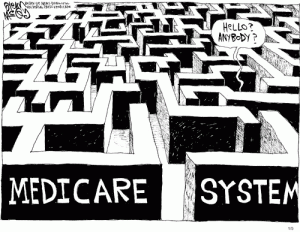Last week I published an article titled “The Perpetual Problem . . .” in which I wrote about how The Stratford assisted living community in Phoenix developed a very creative program that allowed residents who were experiencing increased confusion to stay in their mainstream assisted living for extra weeks or months, before needing to be moved to a higher level of care. After publishing the article I posted the article in a number of LinkedIn groups and sent out an email with the following headline: “Are you looking for a way to hold on to your residents for a few more months as their cognitive abilities fade?” In quickly became one of the top read articles and received many positive comments. However, there were several people who took offense to the article because they felt the focus was primarily on how extract the highest profits from a vulnerable senior population. I thought it would be interesting this week, to spend a little time on the seeming competing goals of looking out for the best interests of seniors and making a profit. As a preamble I want to say, that I really appreciate all of the comments. While kudos are always the most fun, in some respects those who offer a disagreement create a level of richness in the discussion that would not otherwise be there. So I thank all of you who have commented and encourage you to keep it up.
Profiting From the Senior Marketplace
I have a very strong belief that the ability to make a profit is the one thing that ensures a high quality of care.
Here is why:
1. Senior housing/senior services are offered in a competitive marketplace
If the services are inadequate or the price is too high, seniors and their families can and will choose alternative solutions to meet their needs. This means that smart, caring operators will always be assessing what they are offering relative to the needs and desires of seniors, improving, tweaking and re-pricing to be as competitive as possible.
2. The opportunity to profit spurs innovation
We are seeing a proliferation of memory care communities, partly because of an increased awareness, but mostly because it represents an opportunity for the developers and operators to make a profit. Right now, because at Vigil we have the most sophisticated dementia focused call system I am spending a lot of time talking with some emerging memory care companies and it is really exciting to talk with them about what they have learned and how they are taking that knowledge to create the next generation of memory care communities.
3. The lack of profits drives out poor operators
If a community is not doing a good job of serving the needs of their residents, they will not be successful. Ultimately you will see those communities close their doors or they will be taken over by companies that are more committed to high quality resident care. Perhaps the skilled nursing marketplace is provides the most striking example as to how the profit motivation improves quality of care. Consistently the highest quality of cares takes place in communities that have the highest percentage of private pay and high paying Medicare residents.
Essentially always when you hear stories of terrible abusive skilled nursing communities it is those where almost all of the residents are receiving Medicaid. They receive just enough money to provide the bare minimum levels of care and because their profits are minimal they often times do not have the financial reserves to weather census fluctuations, payment delays, or just those unexpected periodic large expenditures, like roof replacements. Perhaps one of the wisest things I ever heard with respect to senior housing was this: “No margin, no mission!” Steve Moran
Don’t miss a single issue of Senior Housing Forum, subscribe today.It is free! We do not sell or share your contact information. The posts are practical and never too long. Go to the main page of Senior Housing Forum and on the right hand side you will see a place to enter your email to subscribe. You will receive notification when a new article is posted. You can unsubscribe at any time.
Finally: If you know anyone who is looking at emergency call systems I would appreciate the opportunity to talk with them about Vigil Health Solutions.








Yes operators need to be smart. But not just “business smart” . This vulnerable senior population is comprised of individuals with multiple medical diagnoses and chronic health care conditions,not to mention the impending Alzheimer’s Disease epidemic…many retirement communities are now finding that behavioral issues are prevalent in all areas of their communites,not just in the memory care unit and stressed out professional caregivers (especially those in personal care) need help managing this. I see marketing dollars used to promote “memory care” in retirement communities but not much spent towards providing ongoing support,education and training for the staff who are providing the service. Technology is great but think about how much more money you could save if the behaviors that prompt the call bells to ring were minimized! Skilled Nursing Facilties(SNFs) have become subacute as they go after the “medicare dollars” . The long term private payor does not exist anymore as more and more seniors protect assets. We are seeing more elders move quickly from the hospital to the subacute nursing home who is telling them they have to find another place(personal care or poorer quality nursing home) or go home after they rehab . Often times this other place or going home is not in the best interest of the senior resulting in another hospital admission (because the chronic conditions and multiple medical diagnoses are not monitored) Who benefits? The assisted living facilities who are competing for residents as more and more elders are staying home with home care resources and the SNFs who will continue to rehab them after the hospital stay.
Hello Steve,
I have been reading your blogs for some time and I can say that I really enjoy them. I have read the controversial blog (“Are you looking for a way to hold on to your residents for a few more months as their cognitive abilities fade?”) and realized that while many were addressing it from a general point of view, I personally read it from a practical point of view…I am a small care community where the people that the ALF ‘try to hold on’ often will transition to. Now, I should have been concerned after reading it but actually I was relieved. Do you know why? Because for many times the residents that were rushed through the ALF’s door due to decrease in cognitive abilities (therefore, an increased liability for ALF) had a time restriction (30 days, 14 days) and it puts a great burden on the resident’s family and the other care communities (it sounds like shooting myself in the leg, right? It is if I would be looking only at my side. But one cannot be in this business of serving with compassion and look only to their side and not consider all the parties involved and the entire scenario).
Taking into consideration that many of the children that have POAs work; the time to visit alternative places is limited and they want to make the best choice for their parents and gather as many resources/information as possible (I would do the same). If one wants the transition to goes smooth then lunches at the new place are scheduled and things are done with great consideration, education and information. I remember so many family members rushing through tours and assessments left incomplete due to the lack of time and then on top if you add the emotional issues (dealing with the decline of their parent’s being), their life issues (work, kids, grand-kids, responsibilities, etc.)…One can only imagine. It can get very hectic and several times I felt very bad for the residents and their families because sometimes the transition can be done in 30 days and sometimes it can be done in 45 days; it depends on the family representative’s life responsibilities and synergy and it is nice for them to get an extension instead of a deadline such as “We give you 14/30 days to move your parent”. The alternative that you describe unexpectedly is a win-win-win situation (for the resident/family representative, ALF and the alternative care community) and congrats to the one who developed it! … and Yes! There is nothing wrong with looking at the economics because as you mentioned without it, if the communities will not turn a profit then we would have institutionalized, governmental long-term care places. I know how challenging long-term care is and I have a high respect for everyone that provides quality of care with compassion.
From a futuristic standpoint I look at a profit (by the way regardless if we are a for profit or not for profit entity) as allowing us in the senior services industry to continue to reinvest, improve and expand our mission of bringing the best services to the residents and families we serve. Without it, the reason I personally got into and stay in this business would be limited and/or in jeopardy of continuing.
Great topic.
I visit facilities daily and see many different situations.
The main thing should be the care of patients (clients) what is best for them. How comfortable you can make them, what is the level of care?
Profit is a driving factor there is no way around it.
Those with the better ways of paying seems to get the better service and care. Many may not want to admit this is a big factor because most want to provide the best possible situation.
Training is so very important for all involved, from administration to the CNA’s. There has to be communication and respect from the all elements of a facility to maximize how the clients are treated.
Behaviors are ever changing combined with health issues puts added stress on the staff. With staff burnout and turnover happening makes it hard to find trained quality people.
You will have to pay more thus salary is one of the biggest cost and profits can be affected. So do you pay more or cut corners?
How moral is your profit? You are in business to profit but what will you do to profit is the question?
Lisa you make some great points. I continue to watch with great interest as caring for seniors continues to evolve. I suspect that we will see some very rough spots along the road.
Steve Moran
From LinkedIn Groups
Profit is one thing. Having a system in which the homes of elders, the communities they live in, are owned by entities and persons who are beholden to investors and the whole MORE, MORE, MORE PROFITS! game… That is unethical. Senior living communities should be foundations and/or owned by occupants, ideally. They should be set up with ownership models for the people who live there. Those who run them should be beholden to the occupants, their families and perhaps those who do the daily work. There could be a combination ownership model that includes an “employee owned” element. And the larger community of families and future occupants could be stake-holders too, as we all are for schools and roads. I think the current arrangement is obscene. There. I said how I really feel!
Posted by Rachel Mohlere
From LinkedIn Groups
Steve Moran • Hi Rachel:
I appreciate your comments. I think one of the great conundrums in Senior Housing and specifically with respect to skilled nursing is that if it were not for the “for profit” providers there would be a huge shortage of beds for residents on Mediaide. When you look at the not-for-profit senior housing world, for the most part they are focused on well healed residents and not on the lower end.
I am just now quite sure how we are going to accomidate those seniors who have few or no financial resources.
Steve
I agree with you wholeheartedly. In a capitalistic society if you are not competitive you will quite simply fail. The freedom to choose is always there and if someone doesn’t like what you are doing because of quality of service, price or for any other reason they simply not choice you. If the company is not constantly improving either through service or price they will go out of business. Our economy is fully of examples of once giants simply vanishing from the scene. Companies like Wards which was once a major player in retail is no longer around. KMart was the original discounting giant and look where they are today. Competition is never a game for the timid. Our country was founded on “rugged individualism” and flourished until recently when the federal government has tried to “level the playing field” and has tried to establish “fairness”. What we now have is companies existing on government subsidies who can’t produce a legitimate worthwhile product. Capitalism often doesn’t appear to be “fair, nice or caring” but it does produce a survival of the fitest. The current example of this seemingly ruthlessness is WalMart. What its detractors don’t want to admit is everyone has a choice it they want to work for them or shop with them. What WalMart has done though effective marketing and management is bring goods to many Americans at prices and quality not seen in the rest of the world. People still line up at Christmas time by the thousands for great bargins and by the thousands when a new store opens and wants to hire staff.
Since when has profit become a dirty word? And when are other people allowed to determine the ethics of others? A person should decide their own ethics and vote with their pocketbook. As Chief Justice Marshall said a number of years ago “your rights end at my nose”.
I loved the comment on residents(Patients) being stake holders; however, due to the misunderstanding of Alzheimer’s Disease specificaly and dementia in general the public believes the individual will be responding in clarity at one time or another. We in the service industry know that we receive the person well in to the disease process, so we are dealing with the Adult Children. Assisted Living can deal with Alzheimer’s disease in most cases, I believe public dollars like Medicare and/orMedicaid should be more available instead of waiting for another disease process, which complicates the care, to appear and then apply resources. An answer dealing with early prevention or early intervention could save the Healthcare System dollars. However, we are still a Disease focused medical society. I applaud the many Assisted Livings that have gone to a “Bridge Care” for dementia residents and hopefully we can concentrate funding in these areas.
No margin, no mission?
There is truth in this. However, there is another side of the story.
No mission, no margin is also true.
Numerous studies demonstrate quality and service advantages for the not for profit sector. “People before profits” as LeadingAge Ohio phrases it.
How to Choose an Assisted Living Residence..
http://www.50plusmarketplacenews.com/boulder.htm